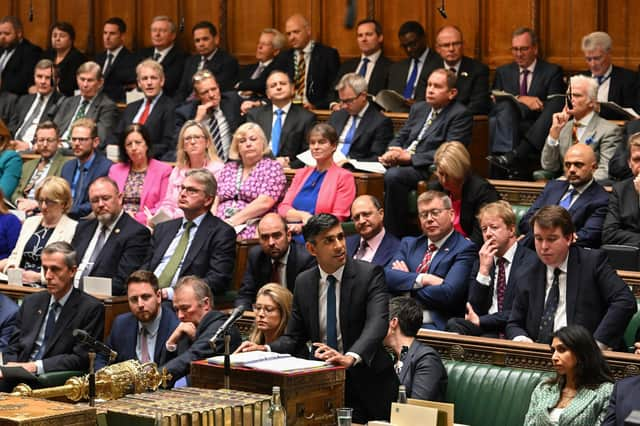Owen Polley: No unionist saviour is likely to emerge from Tory infighting over the EU parcel rules for Northern Ireland


This was done to allow Windsor Framework postal rules to pass unhindered. The quintet expressed alarm at regulations that treat parcels moving from Great Britain to Northern Ireland as ‘foreign postal packets’, requiring, in some cases, customs declarations and checks. A source from the European Research Group (ERG) of Conservative MPs, who backed Brexit strongly, told the Daily Express that the government is “creating a border with Northern Ireland for parcels where the EU can unilaterally change its mind”.
This analysis is accurate. Previously, I highlighted the likely impact of the new regulations on the public and businesses, while Baroness Hoey last week pointed out that packages arriving here will be treated as if they were entering the EU. If Brussels decided to tighten up its rules in the future, the changes would also apply to Northern Ireland.
Advertisement
Hide AdAdvertisement
Hide AdDuring recent Tory skirmishes, the party’s right-wing, Brexit supporting MPs have usually been more critical of the Irish Sea border than left-leaning equivalents. Going back even to Boris Johnson’s time as premier, the likes of the European Research Group (ERG), Lord Frost and Liz Truss at least recognised that the Northern Ireland Protocol damaged the Union and needed to be changed, even if they were complicit in its agreement and implementation.
That makes it seem, to many Ulster unionists, that the right of the Conservative Party contains more reliable allies than its left. There’s evidence to support this perception, because some Tory remainers supported the demands of the EU and the Republic of Ireland during negotiations, and used Northern Ireland cynically to try to forge a closer relationship with Brussels for the whole UK.
However, there are also legitimate reasons for scepticism about this thesis, and many examples of Tory right-wingers’ unreliability. Most infamously, of course, Boris Johnson attacked Theresa May for agreeing to a border in the Irish Sea, before becoming prime minister and almost instantly accepting and implementing a similar frontier.
The Brexiteer view has always been that this decision was necessary, because otherwise the UK would have been prevented from leaving the EU altogether, and Jeremy Corbyn may have got into power. That argument is not without foundation, but it was at best reckless to risk damaging the Union on the basis that the government could ‘get Brexit done’ and address problems with its deal later.
Advertisement
Hide AdAdvertisement
Hide AdWhen he still seemed interested in unionists’ perceptions of this government, the NIO junior minister, Steve Baker, used similar logic when he argued in an interview with the News Letter that the protocol was necessary. Like the secretary of state, Chris Heaton-Harris, he was a former chairman of the ERG.
The Eurosceptic group recently endorsed a report that urged the government to drop the Windsor Framework and implement a system of ‘mutual enforcement’, even if that meant acting without the agreement of the EU. In contrast, ensconced in Rishi Sunak’s government, Baker and Heaton-Harris now advocate the benefits of the framework and scold unionists for their implacable opposition to the sea border.
The former Brexit minister, Lord Frost, was another influential Tory right-winger who explained and excused Johnson’s decision to sign the protocol. In contrast to the NIO ministers, though, he subsequently criticised the sea border consistently and maintains that it needs to be changed. Indeed, he co-authored a ‘command paper’ for the government that eventually formed the basis of a bill that could have dealt with many of its worst flaws.
Frost is critical of Sunak’s deal too, but he’s no longer a government minister. He’s an important figure on the wing of the party that demands that its leadership returns to more ‘authentic’ conservative values.
Advertisement
Hide AdAdvertisement
Hide AdAs the Tories struggle to redefine their purpose and principles in the aftermath of Brexit, Boris and the pandemic, Northern Ireland intermittently becomes a talking-point in the battle for the party’s heart. Our constitutional status, though, is only one of a number of important issues confronting the UK; including economic instability, energy security, the debate about immigration, and a culture war over race and gender – imported from the US – that threatens to tear up the foundations of our society. The prime minister has promised to take action in these policy areas, but his critics feel, with justification, that his solutions have been half-hearted, ineffective or have simply not materialised at all.
The Conservatives, in the midst of all these problems, are convulsed by arguments about how to respond. Many of Sunak’s internal rivals are already resigned to losing the next general election, but hope to salvage enough seats to challenge his leadership afterwards. This mindset will have been entrenched by more Tory by-election defeats last week. In that context, it’s naïve to expect Conservative MPs, from whichever faction, to maintain a consistent focus on Northern Ireland’s sea border.
It is possible that the party’s policy could change if the ‘right’ were to retake control from Sunak, but it’s not guaranteed and, arguably, it’s not even likely. In any case, before that happens, we’re likely to see a Labour government under Keir Starmer that will reconfigure our relationship with the EU.
None of this means that unionists here should be detached, or lack strong opinions, on the currents of national politics. But they should at least be sceptical about the prospect of potential saviours emerging from this Conservative civil war.